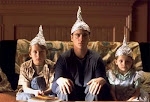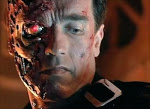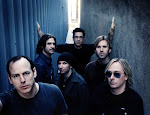One of C.S. Lewis' goals in writing the Chronicles of Narnia was to demonstrate God's amazing imagination. There are some people who think bigger than others, but God thinks ridiculously big. This ties in with the fact that God is holy. His mind isn't limited to the world as we know it because He is set apart from, or different from, the world as we know it.
Thus, the central conflict in Prince Caspian: Aslan (Lewis' representation of Christ) is omnipotent, but the Narnians struggle to trust Him as such. Another way to say this is: The Narnians are quick to become either distracted and forgetful.
The main movie poster for Prince Caspian (shown above) demonstrates such distraction. I look at that poster and I think, "Oooh, cool sword," or, "I wonder if that guy is a good fighter?" The Pevensie children's armor and weapons are particularly impressive. Then there is the grandiosity of the Telmarine castle, or the former glory of the Narnian kingdom. But all these things are only temporary. Indeed, the splendor of the Narnian kingdom had faded and crumbled by the time the chilren returned. This is purposeful so that people (and all creatures in general) will remember the ultimate purpose of all that seems impressive right now: If shiny swords or vast kingdoms are awe-inspiring, how much greater must the Creator of the universe be, who invented the molecules that make up these swords and kingdoms!
The Narnian army held the Telmarines off as long as possible, which is admirable, but ultimately Aslan only had to say a word (a roar) and the Narnian forest got up and started fighting off the Telmarines. Then, if doubt remained in the Telmarines' minds as to who was Boss, Aslan made a giant man out of water to swallow their leader. This isn't to say Aslan is good at fighting, this is to say that Aslan (Jesus Christ) has all authority over everything. Swords and horses and shields don't amount to much against the God who called these things into existence out of nothing.
 We can hardly blame the Narnians for feeling intimidated by the vast, disciplined, well-equipped Telmarine army. It took many of the Narnians a thousand years to either stop trusting or forget about Aslan, while we fall in and out of trust in God several times over the course of a single day.
We can hardly blame the Narnians for feeling intimidated by the vast, disciplined, well-equipped Telmarine army. It took many of the Narnians a thousand years to either stop trusting or forget about Aslan, while we fall in and out of trust in God several times over the course of a single day.
Another of C.S. Lewis' goals in writing the Chronicles of Narnia was to demonstrate the nearness of God's kingdom. The fact that God is apart from time, for example, is applicable to our world right now. While World War II rages all around London, Aslan opens the Pevensie children up to other lifetimes' worth of experiences.
That these children were kings and queens over Narnia doesn't demonstrate their greatness (nor should we fixate ourselves on becoming kings and queens our selves), but rather, the children's adventures in Narnia demonstrated the depth and height and width of Aslan's mind. The is no limit His imagination or His power to create because He (Jesus Christ) is God.


























11 comments:
The movie struck me as not much better than a silly action flick.
I think the poster also shows a juxtaposition - in that Prince Caspian is holding his sword and the horn. There is this dichotomy in his figure (as well as us) - do we just in physical strength (the sword) - or in Aslan (the horn). I agree with you that people are too quick to criticize a movie because it isn't hard and fast by the "canon" as it were. Rather, we should be grateful that Prince Caspian has a stronger message than before.
Patrick,
Those are good insights. Some have suggested Lewis structured the Chronicles of Narnia around the cardinal virtues, with Prince Caspian representing faith or fortitude.
I'm glad to have found your blog.
Wow this is deep. Something to think about. Most of my friends who had watched Narnia twice thought about the same way as you did too. =) I admit, whilst I was blinded by how good looking Ben Barnes was as Prince Caspian, the greatness of God didn't even come across my mind... Kind of made me feel ashamed of myself after reading your blog entry on Narnia. Good one Patrick. Whatever you wrote, it's inspiring. Thank you ever so much.
I do agree with you, and it is much better that Narnia stayed nearer to the original story (instead of being made into an action-oriented film), but my problem is with the willingness of our society to accept the overt message of the Chronicles of Narnia and not the overt message of His Dark Materials.
I thought I read somewhere that C. S. Lewis didn't mean for the Chronicles of Narnia to be allegorical. But for me, Aslan and his relationships with the other characters certainly evoke images of what it would be like to be face to face with Christ.
Great blog! Nice commentary on Caspian. I look forward to reading more.
Interesting thoughts. I thought the same thing about how earthly things may seem like the goal to us because everyone is always out to try and get the bigger this, or the better that, but how quickly they fade away.
This flick comes out in NZ on the 19th and I can't wait :)
this blog entry has redeemed my viewing of prince caspian. after watching it i couldn't really find anything redemptive in it, so i just figured it was a fun story. thanks for the insight baller.
<><
Thanks for this post! This is truly enlightening. I am a huge fan of C.S. Lewis, and I know it's an allegory (though, he denies it). This is a perspective that somehow translates Lewis' vision and purpose in writing the Narnia books. It would have been great if only he survives up to now so that we'll know what he thinks about the movie. LOL. Anyway, I love this post! :-)
Post a Comment